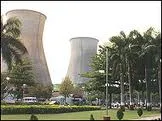
Government says India's nuke plants could withstand disasters
Indian nuclear plants will be able to withstand “extreme natural events” like tsunamis, cyclones, floods and dam breaks, according to a nuclear safety review.
After the Fukushima disaster in Japan, Nuclear Power Corporation of India Limited had set up six taskforces to review safety features in Indian nuclear plants.
“These taskforces have revisited the safety of all nuclear power plants and found that Indian nuclear power reactors have sufficient margins and features in the design to withstand high intensity earthquakes and tsunami,” the government said.
The taskforces also made some recommendations, among them were that reactors will shut down automatically on sensing seismic activity and additional sources of power will be set up, including hook-ups through external sources of power like diesel generators. To factor in a longer duration power cut, the batteries will be augmented. The government is focusing more on keeping the power going in reactors. In Fukushima, loss of the on-site emergency power systems prevented the cooling of the fuel rods. This led to overheating, resulting in hydrogen production and explosion due to a hydrogen fire. These events led to release of radioactivity in Fukushima Daiichi.
Nuclear plants at Tarapur and Madras atomic power stations will be given additional shore protection measures. Emergency operating procedures are being reviewed and training of personnel increased, the government said.
“Safety is a moving target and its upgradation is an ongoing exercise. The features, systems and procedures are periodically reviewed in the context of operational feedback and continuously evolving safety standards,” the government said. However, India will not review its commitment to nuclear energy, the government clarified.








![Cross Domain [Manu + SBR + ABF + ABR + FMCG + HBR + ]](https://cmg-qa.s3.ap-southeast-1.amazonaws.com/s3fs-public/styles/exclusive_featured_article/public/2025-01/earth-3537401_1920_4.jpg.webp?itok=WaRpTJwE)
![Cross Domain [SBR + ABR]](https://cmg-qa.s3.ap-southeast-1.amazonaws.com/s3fs-public/styles/exclusive_featured_article/public/2025-01/pexels-jahoo-867092-2_1.jpg.webp?itok=o7MUL1oO)









 Advertise
Advertise


